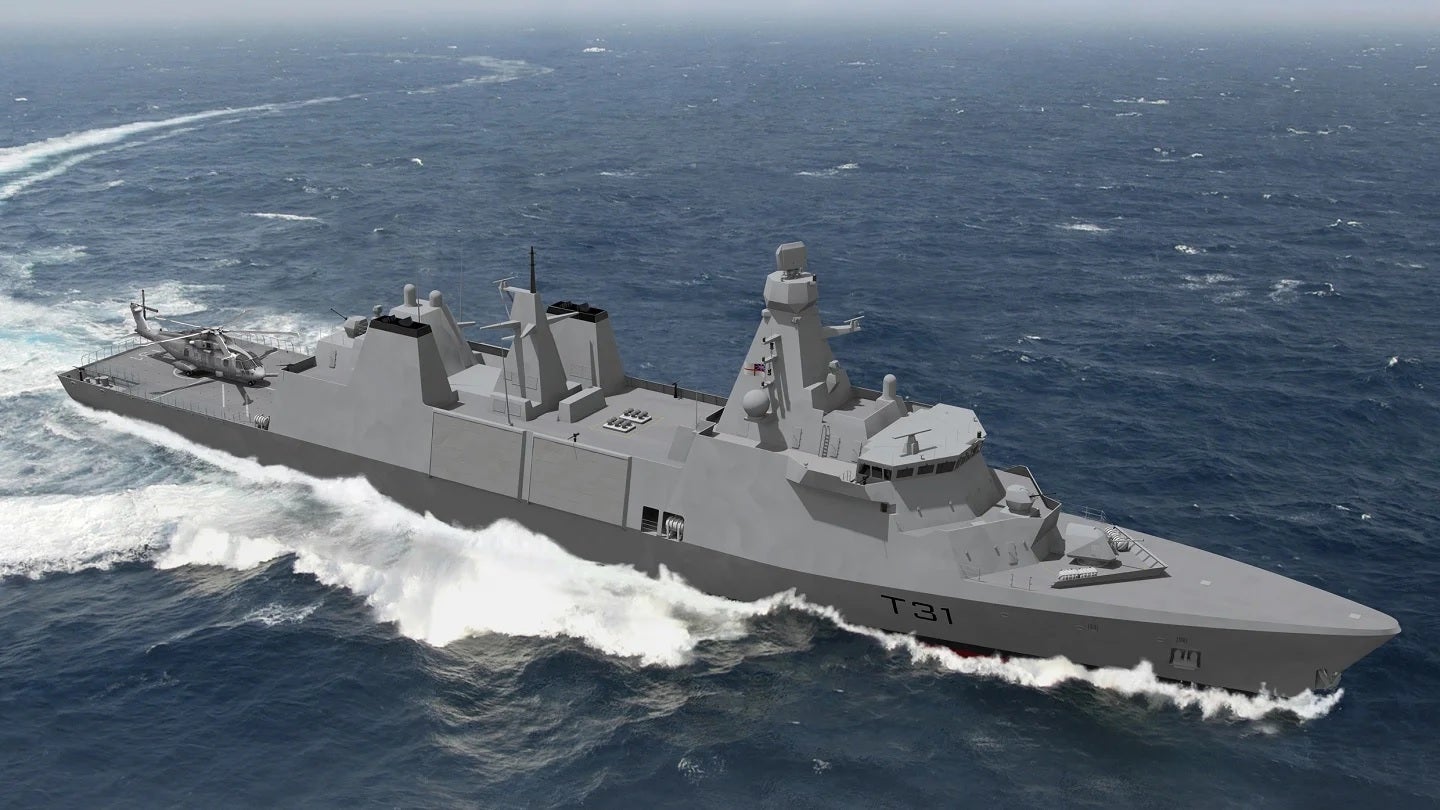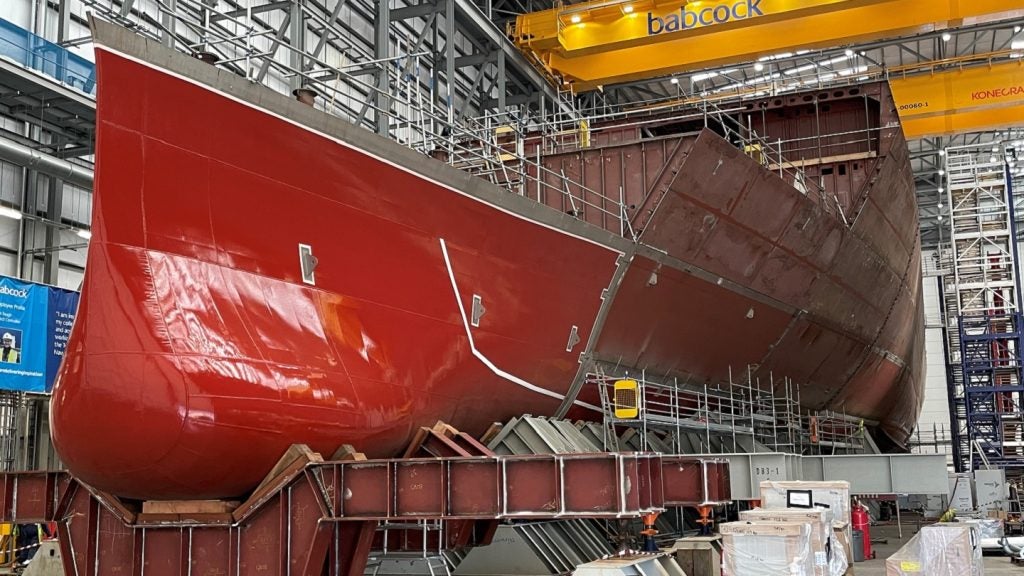
A dispute resolution process (DRP) between UK defence prime Babcock and the UK Ministry of Defence (MoD) on the profitability of the Royal Navy’s Type 31 frigate procurement has been paused, with the company seeking to determine the programme’s actual construction cost.
Providing its half-year (H1) results for 2023 on 14 November, Babcock revealed the DRP with the UK MoD on the Type 31 programme had been paused “following customer discussions”, with both parties “working towards a collaborative solution”.
In April this year, Babcock initiated a DRP with the UK MoD to determine liability for increased costs being sustained on the Type 31 frigate programme, with up to £100m ($125m) in additional funds needed.
Earlier, providing a 2023 financial year and Type 31 update on 20 April, Babcock said it recognised more than £600m in revenue on the programme, which remained on schedule and due to conclude in 2028. However, the programme’s production plan was described as “demanding”, given the impact felt by UK industry during the Covid-19 pandemic, and had seen an increase in actual and projected costs.
Babcock said at the time that despite having been in dialogue with the MoD as to who is responsible for the additional costs under the contact, it had been “unable to reach agreement” and, as such, a DRP commenced.
“Without recovery of the additional costs, the contract would be loss-making and our preliminary assessment, subject to finalisation and audit, is that a one-off provision of between £50 million and £100 million would be required to cover the duration of the contract,” Babcock stated in April.
The original contact was signed in November 2019 to deliver five Inspiration-class Type 31 general-purpose frigates, at an average production cost of £250m per vessel. The first-in-class of the Type 31s, HMS Venturer, is due to be structurally complete in December 2023 and construction commenced on the second ship, HMS Active, in January 2023.
Assessing the Type 31 programme outturn
Type 31 programme estimates published by Babcock on 14 November reiterated that a £100m loss was recorded during the year ended 31 March 2023, “primarily by reducing revenue and creating an onerous contract provision”.
Given this, Babcock said that determining the programme’s outturn – the actual construction cost – required “assumptions and complex judgements to be made about future performance of the contract”.
The company stated key sources of estimates in assessing the Type 31 programme out-turn included the results of the dispute resolution process; build costs over the production schedule and estimate of efficiencies arising from the ‘learner’ effect through performing work over multiple ships; the ability to maintain or improve operational performance through efficiencies and improvements over the five ships; the impact of inflation on the build cost; and the achievement of the build schedule to completion and final acceptance.
“These estimates are inter-related. The range of possible future outcomes in respect of assumptions made to determine the contract outturn could result in a material increase or decrease in revenue and the value of the onerous contract provision, and hence on the Group’s profitability, in the current and next financial year,” Babcock stated in its H1 results.
“With £1bn of estimated costs to go over the life of the contract, if actual recoveries or costs were to differ from those assumed by 5–10%, the potential impact on the contract outturn could be £50–£100m.”
Continuing, Babcock said that over the next financial year design activities “will be finalised” and the construction of HMS Venturer will be “substantially” complete.
“This will reduce the uncertainty over the contract outturn, but a significant element will remain due to the substantial activity which extends over a further four years,” the company said.
The reference to “design activities” could be linked to the proposal to see the US Mk41 vertical launch system integrated into the class, potentially replacing the ‘mushroom farm’ Sea Ceptor air defence system located amidships. With HMS Venturer so far advanced in build, it is unknown whether any design changes could be incorporated into the lead ship, potentially leading to an imbalanced two-variant class.
Babcock outlines Type 31 programme progress
In the H1 2023 results report, Babcock outlined the progress that was being made on the Type 31 frigate programme, stating the first-in-class HMS Venturer was “progressing through construction” with the ship’s superstructure “taking shape”.
In addition, the main engines, gear-boxes and diesel generators have been installed with supporting systems being fitted around them. The next major milestone of HMS Venturer will be float-off, expected in the first half of 2024.
Manufacture of the second ship in class, HMS Active, has seen the first double bottom block completed in the build cradle, following the keel laying earlier in 2023.

The Type 31 build is intended to deliver five general purpose frigates into Royal Navy service to replace five outgoing, and ageing, Type 23 frigates. Any delays in the Type 31 build, which already looks tight given the turnaround of effectively one vessel per year, will impact a Royal Navy surface combatant force that looks set to dip to 15 hulls by the middle of the decade.
A UK parliamentary written response published on 20 October outlined that, on current plans, the last Type 23 frigate will transition out of service in 2035 and eight Type 26 and five Type 31 frigates are expected to begin being brought into service in the early 2030s.
Curiously, the UK MoD has not provided any revised timeline to the Type 23 fleet out-of-service dates, or “specific in-service dates for warships” in order to “avoid revealing elements of the fleet’s long-term schedule”, said UK Defence Minister James Cartlidge.
“However, the Royal Navy continues to ensure that it has sufficient assets available to deliver operational outputs,” Cartlidge stated.
According to the UK’s shipbuilding programme, five Type 31 Inspiration-class general-purpose frigates will be introduced into Royal Navy service from 2027, with Babcock completing the handover of the fifth and final vessel the following year. Following each handover, the Royal Navy will begin a test and trials programme to ensure the vessel is ready for service, with HMS Venturer’s own programme due to be around four years long.
The Type 31 class was born from the realisation by the UK MoD that it could not afford to acquire 13 Type 26 anti-submarine warfare frigates from UK defence prime BAE Systems, instead constraining that programme to eight hulls.
A stop-start competition to determine an alternative five-ship frigate requirement was won by Babcock using its Arrowhead 140 design, heavily derived from the Danish Iver Huitfeldt-class frigates.






